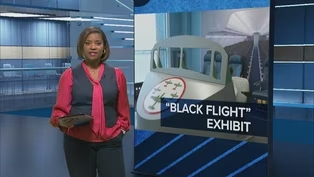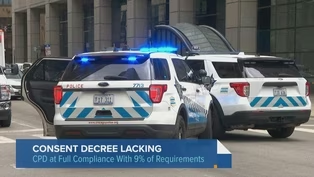Chicago Tonight: Black Voices
Groundbreaking Documentary 'Hoop Dreams' Turns 30
Clip: 11/20/2024 | 9m 42sVideo has Closed Captions
The story follows two Chicago teens with dreams of making it in the NBA in the early '90s.
Six years, two high schoolers, one game. That was the winning combination for "Hoop Dreams," which follows two Chicago teens with dreams of making it in the NBA in the early '90s.
Problems playing video? | Closed Captioning Feedback
Problems playing video? | Closed Captioning Feedback
Chicago Tonight: Black Voices is a local public television program presented by WTTW
Chicago Tonight: Black Voices
Groundbreaking Documentary 'Hoop Dreams' Turns 30
Clip: 11/20/2024 | 9m 42sVideo has Closed Captions
Six years, two high schoolers, one game. That was the winning combination for "Hoop Dreams," which follows two Chicago teens with dreams of making it in the NBA in the early '90s.
Problems playing video? | Closed Captioning Feedback
How to Watch Chicago Tonight: Black Voices
Chicago Tonight: Black Voices is available to stream on pbs.org and the free PBS App, available on iPhone, Apple TV, Android TV, Android smartphones, Amazon Fire TV, Amazon Fire Tablet, Roku, Samsung Smart TV, and Vizio.
Providing Support for PBS.org
Learn Moreabout PBS online sponsorshipschoolers, one game.
That was the winning combination for the groundbreaking documentary Hoop Dreams.
>> Which just turned 30 years old.
The story follows to Chicago teens with dreams of making it in the NBA in the early 90's.
But what viewers came away with was so much more here with more are a couple of the film's main players.
And by that, I mean, director and producer Steve James and Co star William Gates.
Gentlemen, thank you both for joining us.
Congrats on 30 years Steve.
James, let's start with you.
When you created this film, did you have any idea that it would have such a long lasting impact at the time?
>> no, I mean, it started as half-hour short.
We're going to complete within 6 months that didn't work out.
Thank God and then when it was going to come out, it was a 3, our a documentary about 2 guys.
Most people had never heard of.
Pursuing basketball dream.
And we we thought we'd be lucky to get a decent time slot on PBS.
Much less have it be talking about today.
>> how is this film?
Why do you think it is still relevant today?
>> Well, I think it's relevant for a lot of good reasons.
And and maybe some not so good reasons.
I mean, I think that William and Arthur story is amazing.
And they're amazing guys and their families are amazing.
And they they allowed us in and such a beautifully intimate in on its way to tell their stories.
I think it was a timeless kind of story to tell their their pursuit of the dreams and all the obstacles that they faced as families and as players.
But I think part of those obstacles, which which are still with us is part of why Hoop Dreams still has relevance today.
I mean, the city of Chicago, like many big cities, is still some struggling with a lot of the same issues of poverty and racism and inequity that we saw back then if anything in Chicago, things have gotten worse a lot of the neighborhoods.
I mean, will Arthur's Westside, neighborhood, West Garfield Park.
It's a ghost town compared to what it when we were filming.
There's been such an exodus of people out in desperation there, Marshall Metro High School where he went to school, I think probably has about 50 kids in it.
Now 1700 kids when we were filming.
So and Williams neighborhood has changed dramatically and it weighs are good and not so good.
So it's like to see partly that as well.
>> Yeah, the remains of Cabrini Green are no more.
It is quite different.
Of course, you're referencing your other costar Arthur Agee couldn't be with us tonight.
But we've got William William, you know, considering that making it into a sports league.
>> For almost anybody, it's like a 1 million shots.
Do you think we are still that?
We're still encouraging young people to pursue sports or music as a way to escape poverty that we maybe should be reconsidering.
>> Think we we consider it.
I think it's part of our fabric.
I think it gives us life as a kid growing up.
remember being that 14 year-old kid looking out my neighborhood went to a nice to be able to see the John Hancock building a subtle white lights at the top.
And that's really what dream started out.
Like.
I want to live up there one day.
And that's all basketball as a path to get there.
I think anything I think we need invest in it.
But I think we need to do it in a way that's healthy.
I don't know.
Always the way for look like that.
But I think the drain to make it in life, whether it's academics.
But this f Lenox.
Let's push we have to okay.
Yes, let's encourage encourage the dream, whatever the dream might be, whether it is basketball or any other sport or >> or something academic.
How do we encourage, you know, young black men to consider those dreams, too.
I think I think what you're doing is kind of like what we saw when our to that we we dedicated the court over there and Garfield part.
>> To me that symbolize, let's get back to the grassroots approach.
Let's let's get kids back out on the playground.
I think that's one way to, you know, take the community back We heard Steve just talk about a few minutes ago.
Some things not changed, but I remember a time when I playing that it was actually a safe haven to go to the playground.
I think that needs to be, you revisited open back up again because think all kids a good opportunity to grow to build, be inspired and live out their So I hopefully we can get them back out there back outside again.
Yeah, yeah.
You mentioned that that basketball court when it come back to that.
Before we let you go on that, Steve, you went into making this film.
>> In pursuit of a story about future NBA players.
Obviously, you ended up painting a much more complete picture with teams of poverty and drug addiction, gangs and violence.
Definitely.
I saw some cultural differences between different kinds of schools.
What were the challenges for you as a filmmaker?
Well, I mean, I think part of the challenge for me and my Frederick Marx Peter Gilbert.
>> Was that, you know, we didn't grow up in these neighborhoods.
We were white filmmakers coming into a situation that was very different from our own lives.
I think the common bond for us with Arthur and William and their families was a love of basketball.
You I wasn't nearly as good a basketball player as William or Arthur, although I did.
The Arthur one-on-one he's not here to defend himself.
take what you get when I bring that up.
>> but I think basketball became this common bond, but it also then opened up an avenue for us to really come to understand by spending the time there and spend years there.
>> With their, you know, with their openness to us to, to really witness some of things that we captured in the film.
>> William, I think a lot of people probably want to know what was your life like after the film?
>> You know, interesting It's.
I kind of light.
I think the opposite about kind like ducked underneath the failed and really he hid from the spotlight of the movie because my mindset, when 2 I got a family, need to raise my kids.
Just got married.
So I took life a little bit differently.
But in terms of I can say this now, in terms of that 30 years, I I truly enjoy being a part of everything that who changed up for my life because is open up doors that probably would have not been opened up or easily open up, had it not been for the movie itself.
That meeting that all the life challenges disappeared.
It given us and leg up in life.
Not just me, but and his family.
And I see that my kids now.
>> William, you, spend some of your time talking to young people today.
What is the message that you give them when they're considering pursuing a sport or any dream of theirs?
>> What is the mess is not good picking book from my my.
But my older brother Curtis Di Resta.
So Curtis said used a, don't let the game use use you.
And the thing that I took away from that is and as with all of the people that I speak say, hey, hope drinks at its core at his core.
Just say this and score.
It's a basketball movie.
So are we didn't achieve the ultimate hope.
James, a plan in the NBA.
But along the way, we discover new dreams about ourselves.
We discover new aspects about a sales and it created new visions for us.
with them and let them know that hey, making it and sports making it in entertainment.
The odds aslyum domain, you can't beat the so you shoot for.
But at the same time alone, the way.
Grab all the other things that can help you go in life that can help you build a life.
And as you pursuing that dream watching blossom right in your face, take other take all of life's other lessons along the way.
>> I'm Steve, before we run out of time, you into the film with a sound bite from William saying If I don't make it in the NBA, are you going remember me?
What would you say that the message that you wanted viewers to take away from the film is in about 30 seconds.
>> Well, when when Williams said that the U.S. when he was up at Marquette, I remember saying to Peter, that's the last line in the movie.
And that's because I think William really summed up.
Both the sort of lure of the dream and pursuing the dream, but also an understanding that he showed this limitations and that there's more to this than making it to the NBA.
There's more to life than making it to the NBA.
>> Okay.
And we're just at a time.
But William, really quick.
I did want to mention that you and your costar Arthur, you gifted the West side within artfully refurbished basketball courts.
I know that.
And we're looking at a quick picture right now.
Know that was something that was important for you all to do, especially are working with the young people.
We have to leave it there.
My thanks to Steve James and William
Exhibit Showcases Black Excellence in Aviation and Aerospace
Video has Closed Captions
Clip: 11/20/2024 | 2m 34s | The Chicago Children's Museum is now hosting "Aim High: Soaring With the Tuskegee Airmen." (2m 34s)
In 5 Years, Chicago Has Barely Made Progress on Court-Ordered Police Reforms
Video has Closed Captions
Clip: 11/20/2024 | 7m 31s | The Chicago Police Department has fully complied with just 9% of the consent decree. (7m 31s)
Providing Support for PBS.org
Learn Moreabout PBS online sponsorship
- News and Public Affairs

Top journalists deliver compelling original analysis of the hour's headlines.

- News and Public Affairs

FRONTLINE is investigative journalism that questions, explains and changes our world.












Support for PBS provided by:
Chicago Tonight: Black Voices is a local public television program presented by WTTW

